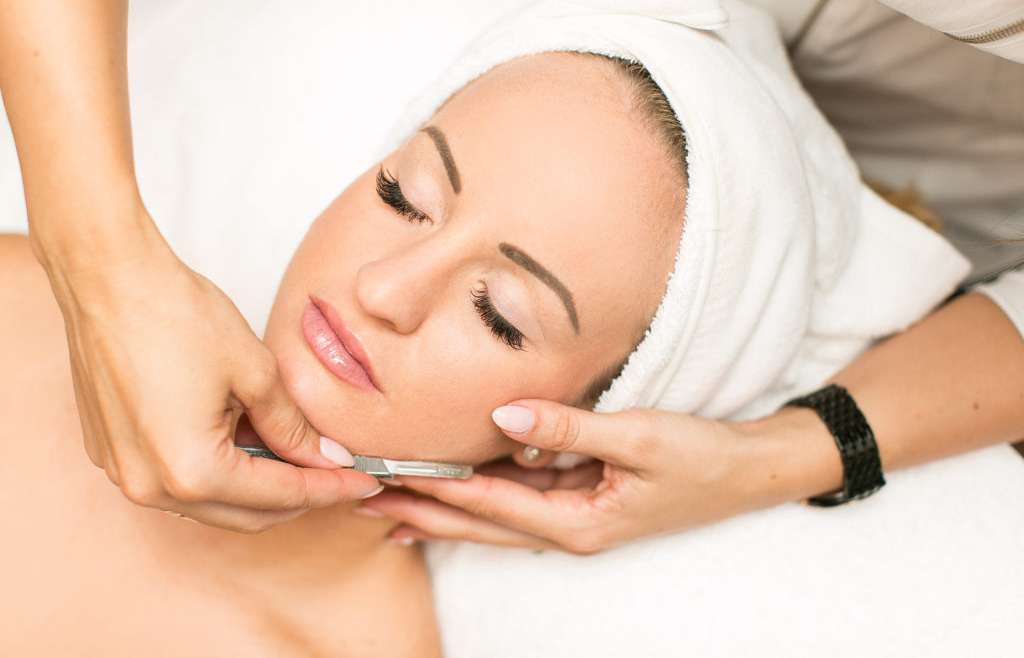Duration: 60 minutes / Price: $175
Dermaplaning treatment is a cutting-edge exfoliation technique. It utilizes precise, practiced strokes of a medical instrument to gently remove dull skin cells and fine, vellus hair. It is safe and does not cause irritation. Dermaplaning is an effective exfoliation alternative to microdermabrasion or chemical peels for sensitive skin types.
Benefits of Dermaplaning:
- Removing peach fuzz (until it grows back, of course)
- Removing facial hair that traps dirt and oils
- Eliminating dead skin cells
- Promoting deeper product penetration
- Boosting the effect of skincare products
- Reducing the appearance of acne scars
- Diminishing the appearance of fine lines and wrinkles
- Working on all skin types
What are the side effects of Dermaplaning?
In the hands of a professional, Dermaplaning is safe for all skin types, especially those with sun damage, fine lines, dry patches, and dull skin. But, of course, there are caveats: If you have highly reactive, sensitive skin (like those with Rosacea or Keratosis Pilaris), you may want to pass on this one, since it might irritate your skin. Same goes for anyone with inflamed acne—unsurprisingly, sliding a sharp scalpel over your zits can irritate them and worsen existing breakouts.
Will Dermaplaning cause breakouts?
A buildup of dead skin can clog your pores and hair follicles, which can not only cause pimples but also block your skincare products from penetrating the skin, which is why exfoliation is essential for maintaining an even, healthy glow. But if you already have an existing breakout, you’ll unfortunately need to sit this treatment out.
Who should I see for my Dermaplaning treatment?
Don’t trust just anyone to perform the procedure. We recommend only seeing a doctor or medical aesthetician to ensure the best and safest results. Do not try this at home. Since Dermaplaning is performed with surgical scalpels (not your average razor), you should leave it to the pros to avoid nicks, ingrowns, and stubble.
Does Dermaplaning hurt?
The thought of a blade sliding across your face is a scary one, but it’s not actually painful at all. Think of it like shaving any other part of your body. Can you feel it? Yes. Does it hurt? Not if you’re doing it right.
Is there any downtime after a Dermaplaning treatment?
Some light redness can be expected but not always. It’s perfectly fine and common to make an appointment during lunch and go right back to work after the 40-minute treatment.
Can you wear makeup after Dermaplaning?
Ever notice how peach fuzz tends to stand out even more underneath foundation and face powders? Well, since Dermaplaning removes all the little hairs on your face, your makeup will actually glide on super smoothly. Although it’s tempting to see the results right away, try to avoid slapping on a face full of makeup immediately after your Dermaplaning treatment.
Let the skin breathe for the rest of the day. If you need to wear makeup, you can, but your skin barrier is more open and may become more irritated. Once your skin has had time to settle (about a day), proceed with your routine make up application.
Should I put anything on my skin after Dermaplaning?
Since your skin barrier will be more vulnerable after Dermaplaning, we recommend using a rich hyaluronic acid mask or hydrating moisturizer to help repair your skin and keep it super hydrated and happy.
Will shaving my face make my hair grow back thicker?
Contrary to what you’ve been told, Dermaplaning will not make your hair grow back thicker or darker. Once your hair begins to grow back, it might feel different because the hair was cut straight across, but it’s actually the same texture as it was before and it will grow at the same speed.
How often do I need Dermaplaning treatments?
Since this is a deeply exfoliating treatment, we recommend waiting at least a month between appointments, although some patients with sensitive skin can limit their treatments to even once a season.
Will Dermaplaning make my skin more sensitive to the sun?
Post-exfoliation, your skin will be especially susceptible to the sun, so if you don’t take sun protection seriously, you might want to skip this treatment altogether. Otherwise, you’ll need to be diligent with the SPF30 or higher afterward but that should be the case every day of your life.
